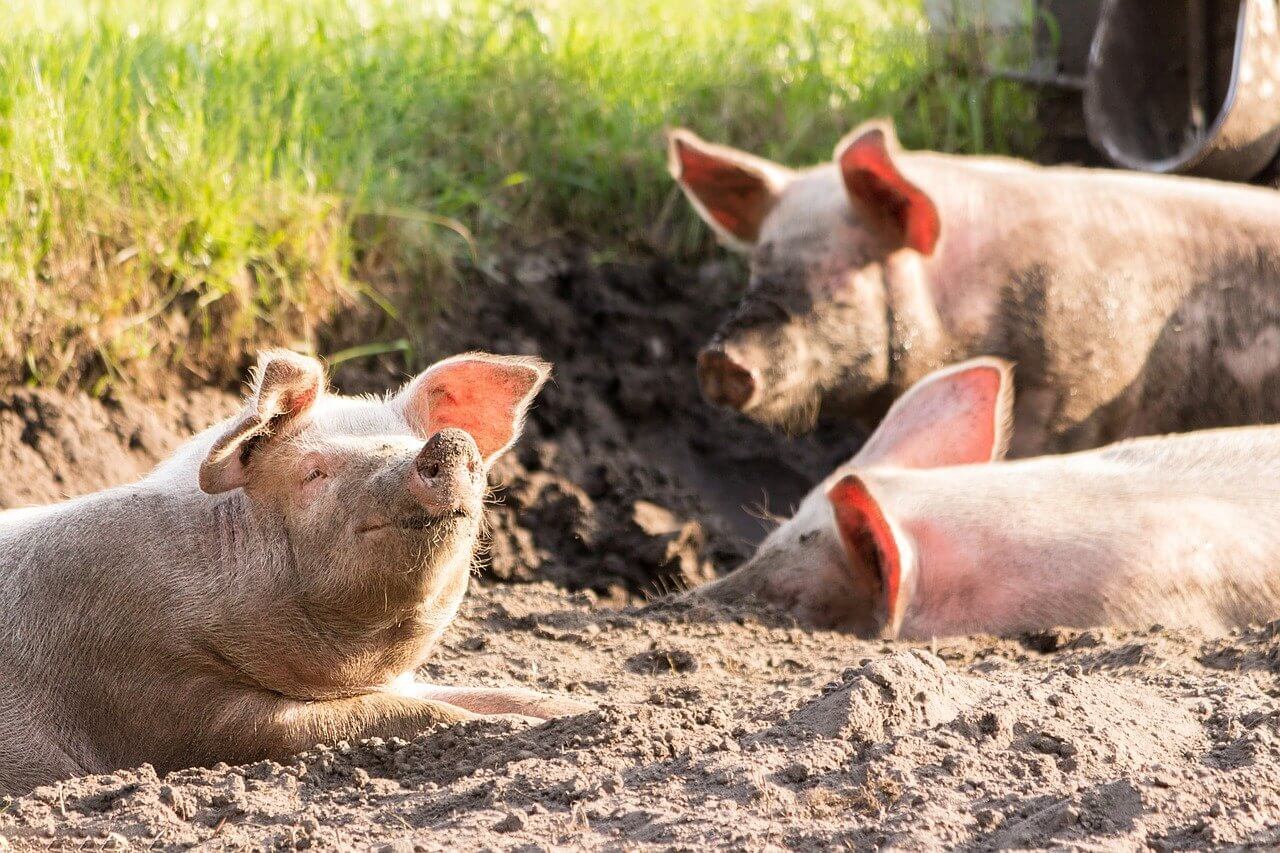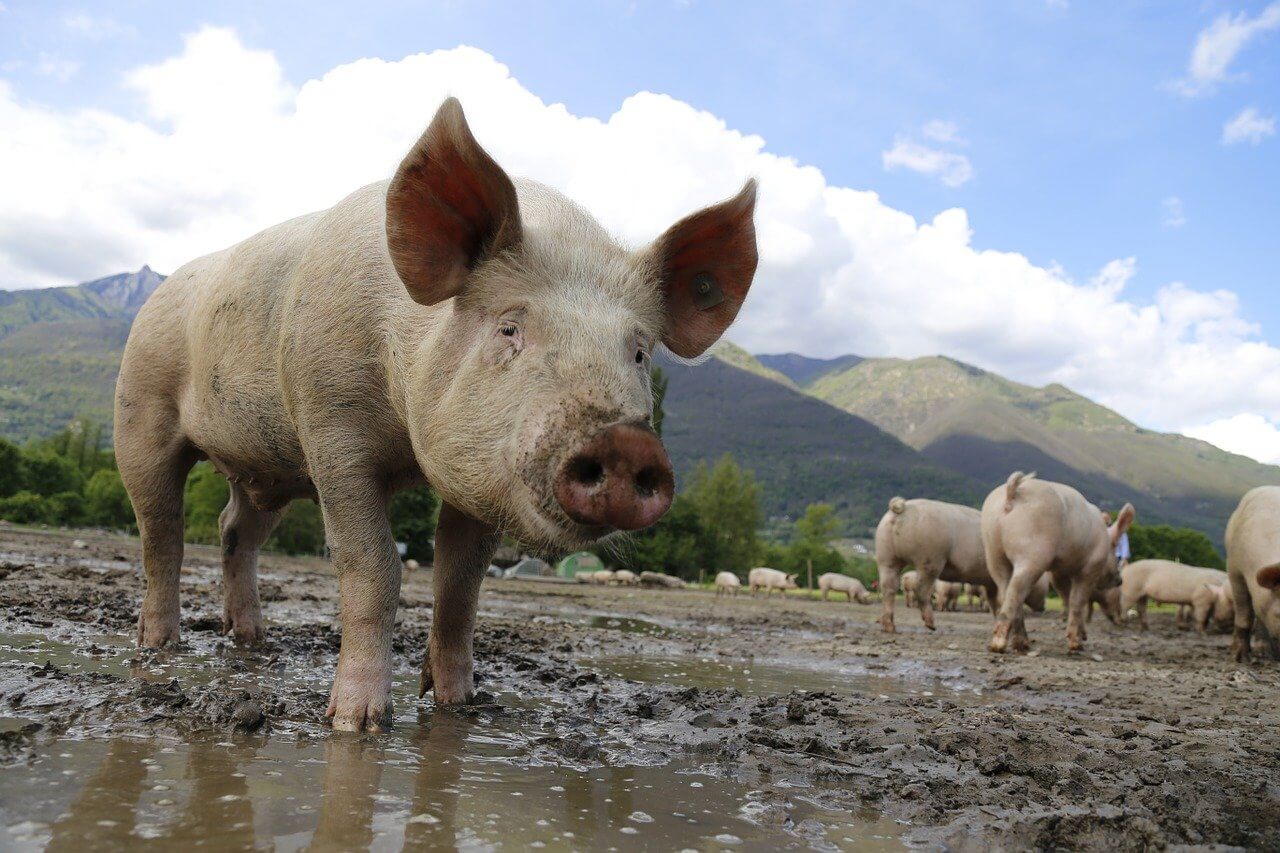Are you wondering how to start a pig farm business? If so, this article will provide you with all the actionable tips you need to be successful.
What You'll Learn Today
- The Advantages of Starting a Pig Farm Business
- How Do I Start a Pig Farm? Considerations to Keep in Mind
- Is Pig Farming a Profitable Business?
The Advantages of Starting a Pig Farm Business

There are several reasons to consider raising pigs for profit.
For one, out of all the farm animals you can raise, pigs are some of the most profitable. Just think about it – they convert inedible feed, forages, grain byproducts, and what we might consider worthless foodstuff into delicious meat!
Not only that, but pigs grow extremely fast to large sizes. They can farrow up to 13 piglets at a time, with one sow capable of producing two litters per year (more than two dozen pigs annually!).
The return on investment is high. Compared to other types of livestock that require lots of maintenance to raise (think of shearing sheep and shoeing horses), pigs require minimal intervention. All you need is the right feed, buildings, and equipment, and you’ve got yourself a successful operation!
Obviously, most people start pig farms to sell the meat. However, you can also sell other byproducts, such as the fat (lard), bones, organs, pigskin, blood meal, and even the ears. You could also start a pig farm that is specifically meant to raise pigs as pets or for breeding stock for other farms.
How Do I Start a Pig Farm? Considerations to Keep in Mind

Pig farming can be extremely profitable – but only if you go about it correctly. Here are some common-sense tips to help you start your pig farm.
Get Experience First – and Make Local Connections
Don’t try to start a pig farming business if you’ve never even seen a pig in real life before. Get a few years of experience in raising pigs under your belt before you decide to go whole hog (pun intended) into the business.
This is an industry that requires a lot of hard work. It can be smelly, dirty, and downright unpleasant- but also rewarding.
There are training programs all over the United States but the best way to get experience is to become a pig farmer yourself. Raise just a couple of pigs for your own family the first year, and you can branch out from there.
If you’re new to pig farming, it’s also a good idea to forge some local connections. They’ll be able to acquaint you with information about the local market, weather conditions, local slaughterhouses, and the best time to harvest your animals.
How Much Does it Cost to Start a Pig Farm? Consider Your Expenses
To start a pig farm, you could spend as little as $500 or as much as $10,000 – or more. It all depends on the size, scale, and scope of your farm.
You will need to take the following costs into consideration:
- Live animals
- Housing
- Feed and water
- Medications and veterinary costs
- Butchering expenses
- Marketing and advertising
- Transportation
- Seeds (if you plan to grow your own feed)
- Packaging
- Storage and cooling
How Many Pigs Do You Need To Start A Pig Farm?
You can start your pig farm with as few as two pigs – a sow or gilt and a boar. As long as they are proven breeders, this can help you jumpstart your operation. However, if you want to amp up your sales, you should start with more than that.
Never start with just one pig. It’s not a good idea for obvious reasons related to breeding but also because pigs get lonely and need companions.
Buy purebred pigs from an acknowledged breeder. This will help you in your marketing and to gain instant credibility with your customers. Plus, you won’t have to worry about transferring any undesired genetics or diseases to your herd.
When you buy pigs, analyze each one. Take a look at it when it’s lying down and when it’s standing up. Watch out for symptoms like lethargy, labored breathing, or aggression.
To get the best return on your investment, consider raising pigs that are best suited for pig farming on a larger scale. These include:
- Berkshire
- Tamworth
- Hampshire
- Landrace
- Large White
- Duroc
- Poland China
A feeder pig can cost anywhere from $100 to more than $200. You can buy pigs from local farmers, online, or at nearby auctions.
Land Costs
You’ll need a barn to house your pigs in, and ideally some land outdoors. We recommend at least one acre for all of this in total, but again, that will vary depending gon where you live and the size of your operation.
Plan to spend anywhere from $1,000 to more than $100,000 just for the land.
A general recommendation for how much land you need is 1000 pounds of pigs per acre – this will give them room to roam.
You don’t have to buy land – you can always rent it – but factor this into your expenses.
Equipment Costs
Equipment costs will vary depending on the size of your farm. You might need to spend a few thousand dollars for used equipment or several hundreds of thousands if you want brand-new gear.
You will also need to factor in costs for things like fences, feeders, waterers, roads, storage buildings, and more.
Feed Costs
Feed costs vary. The average pig will eat an average of six to eight pounds per day. Buying feed in bulk can save you money, but you can estimate that the feed will cost around 25 cents per pound.
Make a Business Plan and Search for Funding
Once you have an idea for your business and are ready to dive in, draw up a business plan. The USDA has all kinds of helpful resources that you can tap into.
If you want to be totally legit for tax purposes, consider incorporating or becoming an LLC.
You may need licenses and permits for your business, too, depending on where you live. The Department of Agriculture has more information on what you might need as well as sources of funding, if you want to take advantage of grants and loans.
Producing Pork
Now that you have a plan for how you will run your business, here comes the hard part – raising the pigs!
Housing Your Pigs
For the first few weeks, you should keep young piglets away from predators by housing them in stalls indoors. This will let you keep a close eye on their health.
Afterward, you can move them outdoors, if you choose.
In any event, outdoor housing is a good idea to protect your pigs from the harsh rays of the sun and inclement weather.
Fencing
In addition to some form of outdoor shelter (like a lean-to) or a barn, you’ll also need to make sure your pigs are securely fenced.
The cheapest way to fence pigs is with perimeter fencing with hot wire. This is ideal for large areas and it goes up quickly. You can also use hog wire roll fencing or hog panels with metal T posts.
Water And Feed
Be sure to keep an adequate supply of fresh water out for your pigs – this should be offered free choice.
When they’re first getting started, you should give our pigs an 18 to 29% feed. Free-choice feeding is ideal.
Gestation And Farrowing
If you plan on breeding pigs (rather than buying piglets each year), know that they should reach 200 to 250 pounds by about six months old. It is at this point that they are ready for breeding.
The pig gestation period is 114 days (three months, three weeks, three days).
Marketing Your Products
Once your pigs are ready to go, it’s time to start marketing your products. You can sell the pork in several ways:
- Direct to consumer (the easiest method in most states, since there’s little red tape in terms of regulations)
- Grocery stores
- Farmer’s markets
- Restaurants
- CSAs
Find customers in your local community and research what they want. This will help you market your products most effectively. Take advantage of a website and social media- it’s easier to create a website than you might think!
Here is a video that will give you some tips on managing social media for your farm:
Is Pig Farming a Profitable Business?
Like any other kind of business, pig farming can be a challenging one to tap into. It requires a lot of hard work, determination, and grit.
However, it can also be quite rewarding. In addition to the abstract benefits of being able to spend time in nature and with animals, you can also make a decent chunk of money to cover your expenses with a little leftover.
Follow these tips for a profitable pig farming business!
Thanks again for your help /ideas